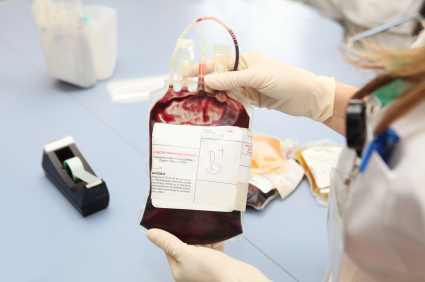This depends on many factors, the most important being the type of operation that you have and the condition of your own blood before surgery. In some surgical procedures the patient sometimes loses a lot of blood, no matter how skilled the surgeon. A large portion of the blood transfused in Canada is given to patients, either during surgery, or just after. All fluids administered in the operating room, including blood, are given by the anesthesiologist. They make the decision whether or not blood transfusion is necessary. Blood is never given unless they feel that the risk of giving it is less than the risk of not giving it. Anesthesiologists are experts at assessing these risks in bleeding patients.
 When you bleed a lot during, or after an operation, the lost blood is initially replaced with non-blood containing solutions. These help to maintain a normal amount of fluid in your blood vessels and a normal blood pressure. However, these solutions dilute your blood. If bleeding continues, the number of red blood cells will become insufficient to transport oxygen around your body. At this stage you will have to be transfused with red blood cells or you may die. Another reason for transfusion occurs when bleeding continues and the blood becomes so dilute that there are not enough special clotting factors and platelet cells. As a result, the blood will not clot, and if these special blood products are not replaced, bleeding will continue indefinitely.
When you bleed a lot during, or after an operation, the lost blood is initially replaced with non-blood containing solutions. These help to maintain a normal amount of fluid in your blood vessels and a normal blood pressure. However, these solutions dilute your blood. If bleeding continues, the number of red blood cells will become insufficient to transport oxygen around your body. At this stage you will have to be transfused with red blood cells or you may die. Another reason for transfusion occurs when bleeding continues and the blood becomes so dilute that there are not enough special clotting factors and platelet cells. As a result, the blood will not clot, and if these special blood products are not replaced, bleeding will continue indefinitely.
Every effort is made to use the blood that actually bleeds out of you, using a machine called a 'cell-saver'. In addition, you may have donated your own blood in the weeks before the operation. This blood would normally be given back to you before you received a transfusion of anyone else's blood.
Presently there are no artificial substitutes for these blood products, although there is considerable research in this area. We can stimulate the body to produce red cells more quickly, and this is a great help for patients who are recovering from severe blood loss during surgery and cannot have blood transfusions. Hopefully, soon there will be safe, synthetic substitutes for blood products. Meanwhile, the blood supply in Canada is as safe as anywhere in the world. From a single unit of blood in Canada today, the chance of contracting Hepatitis C is approximately 1 in 100,000 and the chance of contracting HIV (the AIDS virus) is approximately 1 in 650,000. On the other hand you have a 1 in 10,000 chance of being killed in a motor vehicle accident every year.